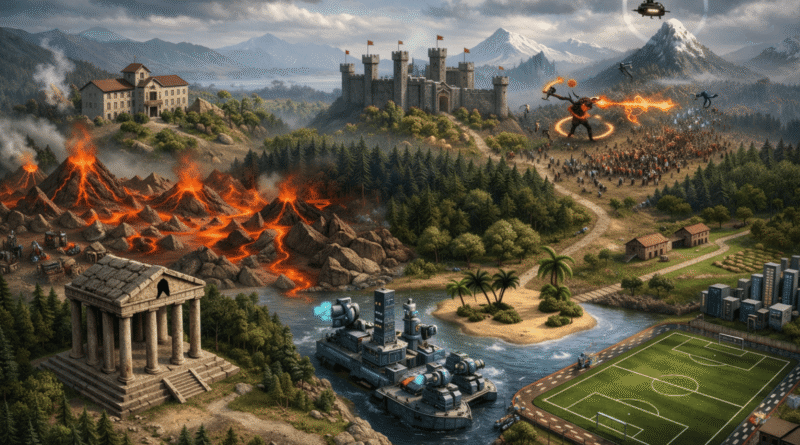Action-Packed Games: A Look at the Best in the Genre
What Defines Action-Packed Games
Action-packed games are a distinctive genre within the gaming industry, marked by several defining characteristics that contribute to their energetic and immersive nature. One of the primary features of these games is their fast-paced gameplay. Players find themselves in dynamic environments where quick reflexes and rapid decision-making are essential. The adrenaline rush associated with high-speed action sequences helps to forge a strong connection between players and the game world, enhancing the overall experience.
Another key characteristic of action-packed games is the emphasis on intense graphics. These games often employ cutting-edge visual technology to create stunning animations and lifelike environments. High-quality graphics not only draw players into the game but also serve to heighten the excitement of the action, with every explosion, combat sequence, or chase being visually captivating. Moreover, the art direction often features bold colors and dramatic lighting that further contributes to a thrilling atmosphere, allowing players to fully engage with the narrative and gameplay elements.
The design elements of movement mechanics and combat systems also play a critical role in defining this genre. In action-packed games, fluid character movements and responsive controls are paramount, ensuring that players can navigate through challenging levels and engage in fierce battles seamlessly. The combat systems are typically innovative, offering various weapons and abilities that cater to diverse play styles and allow for strategic planning. This complexity adds depth to the gameplay, encouraging players to experiment and master their skills.
Overall, the defining qualities of action-packed games are embodied in their engaging gameplay, impressive visual presentations, and intricate design mechanics. These elements work together to create an experience where players can immerse themselves fully and enjoy the thrill of the action alongside a compelling narrative.
Top Action-Packed Games of All Time
The realm of action-packed games has bestowed upon gamers a multitude of exhilarating experiences, each contributing to the genre’s evolution. Among these, several titles stand out for their groundbreaking features, gameplay mechanics, and profound impact on the gaming community. A journey through these iconic games showcases not only the history of action gaming but also its lasting appeal.
One cannot discuss action games without mentioning “Doom,” released in 1993. This game revolutionized first-person shooters, introducing players to fast-paced gameplay and an immersive 3D environment. Its combination of intense combat and intricate level design set a new standard, influencing countless titles in the years that followed. “Doom” created a blueprint for action games characterized by adrenaline-pumping action and engaging multiplayer modes.
Another significant title is “Halo: Combat Evolved,” which debuted in 2001. This game not only changed the way players engaged with first-person shooters on consoles but also introduced a rich narrative and compelling characters. The game’s balanced gameplay mechanics paired with robust multiplayer options led to a transformation in gaming culture, establishing the franchise as a quintessential representative of action-packed adventures.
Moving to the realm of hack-and-slash action, “Devil May Cry,” launched in 2001, also warrants attention. It introduced a stylish combat system that encouraged players to creatively dispatch enemies while emphasizing agility and combo execution. This blend of mechanics and storytelling captivated fans and inspired numerous sequels and imitators within the genre.
Today, the action genre continues to evolve, merging traditional elements with innovative gameplay. Titles like “The Last of Us Part II” have redefined what action games can be, incorporating deep narratives along with intense combat sequences. Through the years, these games not only enriched the player experience but also solidified the place of action-packed games in the annals of video game history.
Emerging Trends in Action Game Development
The landscape of action game development is currently experiencing a significant transformation driven by rapid technological advancements. Virtual reality (VR) and augmented reality (AR) have emerged as pivotal components, allowing players to immerse themselves in dynamic virtual environments. These technologies enhance user engagement, transforming the traditional gameplay into deeply interactive experiences. The incorporation of VR headsets enables users to experience action games in a more visceral manner, while AR blends digital elements with the real world, inviting players to engage in their surroundings like never before.
Additionally, advancements in graphics engines have propelled action games to new visual heights. Enhanced hardware capabilities facilitate the creation of extraordinarily detailed environments, realistic character models, and fluid animations. These improvements not only elevate aesthetic appeal but also contribute to gameplay mechanics, enabling more intricate interactions and physics-based movements within action-driven narratives. As a result, developers are now able to create richer, more immersive worlds, effectively broadening the scope of what action games can achieve.
Another notable trend is the rise of narrative-driven action experiences. As players have become increasingly sophisticated, developers recognize the importance of storytelling alongside traditional gameplay elements. Merging compelling narratives with intense action sequences creates a unique gaming experience that resonates with a diverse audience. This focus on story allows players to form deeper connections with characters and invest emotionally in the gameplay.
Finally, the evolution of multiplayer co-op modes has redefined social gameplay in action games. By fostering collaboration among players, developers encourage team-based strategies, which enhances the overall engagement. With connectivity options and online gameplay becoming more robust, players can share experiences and build communities, further enhancing the longevity of action games. As development continues to evolve, it is clear that the future of action games will be shaped by these emerging trends, leading to innovative experiences that captivate players worldwide.
The Impact of Action Games on Gaming Culture
Action games have significantly shaped the landscape of gaming culture and the broader entertainment industry. As one of the most popular genres, these games have not only attracted large audiences but have also influenced other media forms, notably film and television. Many blockbuster films draw inspiration from action game narratives and aesthetics, creating a cross-pollination effect that enriches both industries. Iconic titles often translate into successful movie adaptations, further blurring the lines between gaming and cinematic experiences. Additionally, television series inspired by gaming franchises have become increasingly commonplace, showcasing the deep-rooted connection between these mediums.
Beyond their influence on films and television, action games play a prominent role in the world of esports. Competitive gaming tournaments, featuring popular action titles, have garnered massive viewership and sponsorship deals. These events not only create global communities of players and fans but also establish gaming as a legitimate sport on par with traditional athletics. The rise of these competitions has fostered a sense of camaraderie among players, allowing for networking and collaboration that transcends geographical boundaries.
However, the cultural impact of action games is not without controversy. Concerns regarding gaming addiction often arise, particularly given the immersive nature of these titles that can lead to excessive gameplay. Additionally, the portrayal of violence in action games raises questions about its effects on players and society. Critics argue that exposure to violent content may desensitize individuals or contribute to aggressive behavior. Nonetheless, proponents of action games highlight their potential for positive engagement, emphasizing community-building experiences and skill development. Ensuring a balanced perspective is essential as the discourse surrounding action games continues to evolve and shape societal perceptions.

